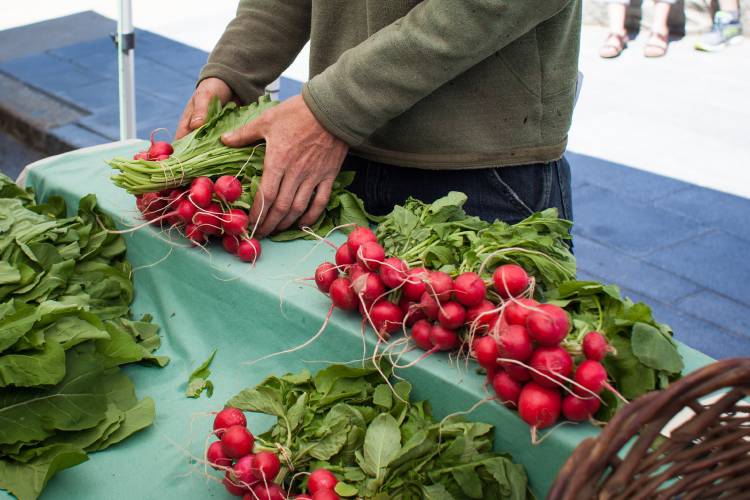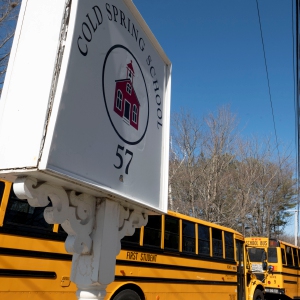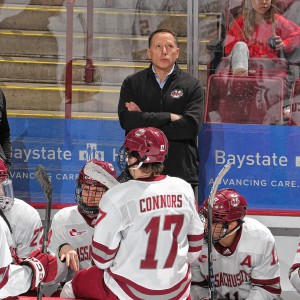House committee defunds relief program for mothers and children, spares SNAP incentives

Bunches of radishes and some arugula for sale from the Kearsarge Gore Farm stand at the Concord Farmers Market in downtown Concord on Saturday, May 5, 2018. Monitor file
| Published: 03-30-2025 12:15 PM |
The New Hampshire legislature cut funding for a hunger relief initiative to help lower-income families buy fresh produce at farmers markets before the program ever took root.
Lawmakers on the House finance committee removed the Women, Infants and Children Farmer’s Market Nutrition Program from the governor’s budget on Tuesday.
The program carried a $560,000 price tag, which proved to be too high for the Republican-led committee. The program will continue to exist on paper but won’t receive any funding during this biennium, a symptom of larger budget constraints.
Committee chair Rep. Jess Edwards told other members: “I have to prioritize the direct care and direct obligation needs above continuing the WIC program,” a choice he said he didn’t like but “we have to make.”
The farmers market program, established in 2023, was set to launch this summer, offering participants $30 to spend on fruits, vegetables and cut herbs between July 1 and October 31. Farmers participating in the program would have received weekly reimbursements for benefits redeemed at farmers’ markets by program participants.
The program initially faced complete extinction: The committee had been discussing, among other amendments, a proposal to eliminate the WIC program. Confronted with these austere odds, Rep. Laura Telerski instead presented an option to suspend it.
“I’m fully aware of the tight fiscal situation, but I was highly concerned that the original amendment actually repealed the entire program,” she explained. “We have some of our most vulnerable people, pregnant moms and kids, who won’t be able to access this program. Alternatively, it hits our farmers. It’s an economic boost to help our local producers. For many of our farmers these markets are a vital part of their business.”
Telerski told the Monitor that some administrative rules prevented the program from getting up and running in the years since it was established. The half-million dollars of revoked funding represents money originally allocated to the program that, owing to these delays, was never spent. That funding will now roll over into the general fund and be repurposed elsewhere in the state budget.
Article continues after...
Yesterday's Most Read Articles
 Nearly all of South Hadley High’s student body holds ‘walkout to walk-in’ rally to oppose cuts, call for funding reform
Nearly all of South Hadley High’s student body holds ‘walkout to walk-in’ rally to oppose cuts, call for funding reform
 Northampton schools probe staff response to student’s unfulfilled IEP
Northampton schools probe staff response to student’s unfulfilled IEP
 Amherst’s Ryan Leonard makes NHL debut for Washington Capitals in 4-3 win over Bruins in Boston
Amherst’s Ryan Leonard makes NHL debut for Washington Capitals in 4-3 win over Bruins in Boston
 Belchertown voters to decide on $3.3M override for schools, town, capital projects
Belchertown voters to decide on $3.3M override for schools, town, capital projects
 Four Red Fire Farm workers arrested as part of ICE operation in Springfield
Four Red Fire Farm workers arrested as part of ICE operation in Springfield
 UMass hockey: Carvel reflects on Minutemen’s successful 2024-25 season
UMass hockey: Carvel reflects on Minutemen’s successful 2024-25 season
While the WIC program was eliminated, the Supplemental Nutrition Assistance Program’ Granite State Market Match and Double Up Food Bucks survived the meeting unscathed. Those incentive programs cost the state an estimated $100,000, which doubles SNAP benefits for fresh produce purchased at local farmers’ markets and retail grocers.
Tiffany Brewster, community engagement director at New Hampshire Hunger Solutions, mobilized more than 170 hunger relief advocates in the span of 24 hours to submit testimonials to committee members in support of preserving two programs.
NH Hunger Solutions has proposed six pieces of legislation during this session, including a flagship initiative to automatically enroll students whose families qualify for Medicaid in free and reduced school lunch programs.
“All of our legislation has failed so far,” Brewster said, adding that the legislature’s apathy to anti-hunger initiatives “is wearing on people. People are definitely feeling discouraged.”
The suspension of the WIC farmer’s market program was a less-than-ideal outcome, but Brewster said she and other advocates are optimistic about the possibility that the legislature will fund the program come the next biennium.
“We’re certainly viewing it as a win. We won’t be starting from ground zero next time,” she said.






 Here come the sweetness: Four new businesses prepping to open in downtown Northampton
Here come the sweetness: Four new businesses prepping to open in downtown Northampton Area property deed transfers, April 4
Area property deed transfers, April 4 Making News in Business, April 4
Making News in Business, April 4 Local ‘Hands Off!’ standouts planned as part of national effort
Local ‘Hands Off!’ standouts planned as part of national effort
